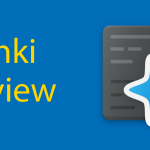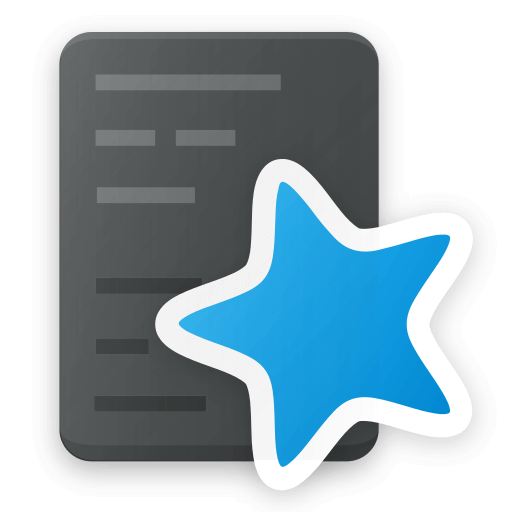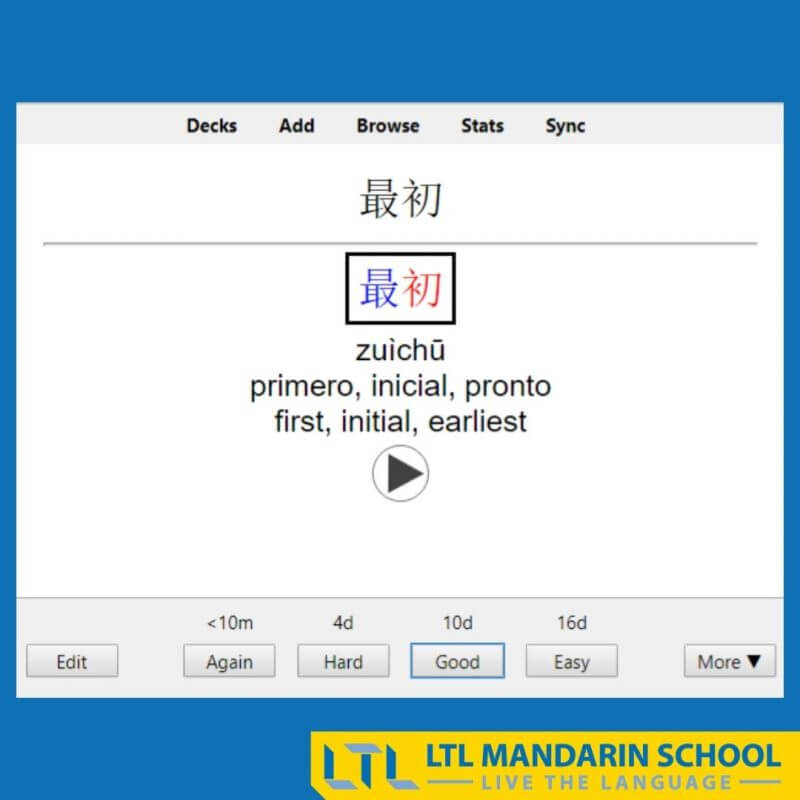Anki Decks // Download These Freebies (Mandarin, Japanese, Korean, Russian & More)
Enhance Your Mandarin With Our Free Anki Decks in Chinese
Want to improve your Mandarin with flashcards? We’ve got just the trick with these FREE-to-use Anki Decks for Chinese learners.
In fact, we’ve got Anki Decks in Korean, Japanese, Russian and even more!
LTL has always been serious about helping our students improve their language skills, not just in class, but also outside of it.
Throughout the years, we have created a Grammar Bank, HSK Vocabulary Tests, App reviews, various blogs about different vocabulary and many others.
We continue doing so and try to provide our students with as many resources as possible.
As one of our newest features, we have created several Anki Decks in Chinese, separated by level, in a variety of languages and dialects for you to use!
Anki Decks Chinese || What is Anki
Anki Decks Chinese || Dialects Available
Anki Decks Chinese || How It Works
Anki Decks Chinese || Customizations
Anki Decks Chinese || Disclaimers
Anki Decks Chinese || HOW TO DOWNLOAD
FREE BONUS || Links to LTL’s Anki Decks
Anki Decks Chinese || FAQs
Anki Decks Chinese // What is Anki
Anki is a Flashcard app that is available on iOS, Android, and PC.
It is a highly customizable app that uses Spaced Repetition System (SRS) to show you the cards you need at the right time.
When you are about to forget them, Anki adjusts itself based on your performance, showing you the right cards at the right time.
We’ve actually written a full review of Anki which you can read here.
DID YOU KNOW – There is also another app similar to Anki called Quizlet – we compared both Anki and Quizlet here also if it’s of interest.
You can download Anki itself from this link.

Anki Review | The Best Flashcard App Ever? (FREE Decks Included)
LTL Taiwan School Director Alex gives us a full Anki review based on his own use of the app for the (many!) languages he is learning.
Anki Decks Chinese // Dialects Available
Currently, as of May 2023, we have three dialects of Chinese available on Anki:

- Cantonese (spoken mainly in Hong Kong, Canton and various diaspora regions around the world)
- Shanghainese (mainly spoken in the city of Shanghai and its surrounding areas)
- Taiwanese Hokkien (spoken in the Southeast of China, as well as on the islands of Taiwan and Singapore).
Cantonese and Shanghainese are separated into 5 levels, based on the length of the sentences inside.
The longer the sentence, the harder it is.
For Taiwanese, currently it only has one level, which includes all lengths.
We plan to increase the available options by offering in the future more languages, such as Mandarin, Japanese, Korean, Vietnamese and others.
Anki Decks Chinese // How It Works
Each card in the deck includes the audio of the sentence in English AND in the target language in all decks available.
As the main aim of the decks is to immerse yourself in the language and learn it through pattern recognition, this is an absolutely crucial part of the learning process.
Cantonese – When you download one of the Anki Decks, it will already include the sentence in English within it, alongside the target language.
Shanghainese & Taiwanese – In the case of Shanghainese and Taiwanese, as those do not have an official writing system, we left the back side of the card either as English or as Mandarin Chinese.
The default process of learning would start with listening to the English sentence spoken first, followed by the target language spoken right after it.

Through the repetition that Anki provides, the same sentence will repeat itself multiple times throughout your learning, allowing you to recognise patterns and deduce vocabulary from these patterns.
Even more importantly, through daily repetition of these sentences, many of them will stick in your mind, allowing you to slowly start speaking in the language.
Each Anki Deck Chinese is separated to 1,500-2,000 sentences.
The idea would be to reach at least 30,000-50,000 reviews/repetitions of cards per each Deck.
That is, each time you see a card with its English and target language played out, this counts as one repetition.
50,000 repetitions seems like a lot, but assuming a daily review of around 150-200 cards (played throughout the day), taking you up around 20 minutes per day, you will be able to finish a deck within around 9 months or less.
Remember: The aim here is not to memorise and focus on each card, but rather to hear the same and similar cards enough times so that the pattern and vocabulary stick in your brain.
As long as you approximately understand what different parts of the sentence are supposed to be, by comparing the English and target language, you can go on to the next card without worrying too much.
The sentences, which are all high frequency common ones, will repeat themselves many times throughout your studies, so the aim is to drill them in, instead of learning each one specifically.
Anki Decks Chinese // Customizations
As Anki allows a high level of customization.
Feel free to change the order of cards around, as well as the front and back sides and what plays first, based on what you feel most comfortable with.
Also, focus on what motivates you to continue your daily routine more.
The default order is English sentence and English audio on the front, and target language sentence and audio on the back.
The reason for this is that by hearing the English first, you will know what you are about to hear on the other side and can prepare better to recognize the patterns and catch the vocabulary.
However, if you wish to focus on listening comprehension for example, you can customize the cards to have the target language audio appear first, and only after it the English audio.
Alternatively, if the aim is complete immersion, after you have reviewed the cards enough, you can choose to only play the target language audio without the English.
The point is that Anki allows this kind of flexibility and it is important that you organize it in a way that will allow you to continue on a daily routine without getting demotivated (in the case of language learning, heavy effort is not necessarily as important as the power of habit, and can sometimes be counterproductive).

Anki vs Quizlet || Which is Better in 2023? *Plus a Bonus Recommendation*
When trying to learn Chinese vocabulary, flash cards are one of the best methods, so let’s put two of the most popular flash card apps to the test: Anki vs Quizlet.
Anki Decks Chinese // Disclaimers
There are some disclaimers that should be mentioned so that everything is clear:
1. Audio – The audio of the English sentences is created through high-quality Text-to-Speech software. It is not an actual speaker speaking it, but it is accurate, understandable and natural-sounding. In the case of the Cantonese deck, the audio is also Text-to-Speech. However, it is likewise accurate and natural-sounding.
2. Speed – The Audio is set at a speed of 1.7 for English, to speed up the process of passage of each card. The target language audio is recorded in natural language speed, without slowing it down, as the aim is to hear it in the same way as when spoken by native speakers.
3. Speaking – As Anki is mainly a repetition tool for purposes of memory, it is not the best tool out there specifically for practising speaking. With enough repetition, you will start recalling the sentences and the patterns automatically, but the best and pretty much the only way to practice speaking is by speaking. This means that having a good teacher that will motivate you to try speaking out loud is extremely important and both the teacher and the decks should work in tandem for a more complete study program.
That’s where we come in…!
While there are lots of various resources available on different languages and dialects, it was important for us to create something like these Anki Decks in Chinese.
This is simply due to the fact that there isn’t enough material on the internet for lesser-known languages such as Hokkien and Shanghainese.
Additionally, because many of the materials that are available are aimed to only give you the very basics of the language.
The Decks available here are aimed to bring you from a complete beginner level to a good upper intermediate level, at which point you can start learning by speaking with native speakers.
We hope it’s useful and happy studying!
Anki Decks Chinese // How To Download
Getting these Anki Decks in Chinese is really quite easy.
There is a video below where you can follow the instructions which come from the Anki channel.
You can also follow the instructions on the Anki website here.
The steps are indeed very simple though as you can see below:
- Click the “Get Shared” button at the bottom of the deck list.
- When you’ve found a deck you’re interested in, click the “Download” button to download a deck package.
- Double-click on the downloaded package to load it into Anki, or File→Import it.
Anki Decks // LTL’s Anki Decks
Here are the links to all the current LTL Anki Decks.
As you’ll see we don’t just cover Mandarin and the dialects of Chinese, but also a host of other languages including Vietnamese, Thai and even Mongolian!
We’ll continue to add to this list going forward.
Mandarin
- LTL Mandarin Deck Level 1 – Short | Download Here
- LTL Mandarin Deck Level 2 – Short Medium | Download Here
- LTL Mandarin Deck Level 3 – Medium | Download Here
- LTL Mandarin Deck Level 4 – Medium Long | Download Here
- LTL Mandarin Deck Level 5 – Long | Download Here
Cantonese
- LTL Cantonese Deck Level 1 – Short | Download Here
- LTL Cantonese Deck Level 2 – Short Medium | Download Here
- LTL Cantonese Deck Level 3 – Medium | Download Here
- LTL Cantonese Deck Level 4 – Medium Long | Download Here
- LTL Cantonese Deck Level 5 – Long | Download Here
Shanghainese
- LTL Shanghainese Deck Level 1 – Short | Download Here
- LTL Shanghainese Deck Level 2 – Medium | Download Here
- LTL Shanghainese Deck Level 3 – Medium Long | Download Here
- LTL Shanghainese Deck Level 4 – Long | Download Here
- LTL Shanghainese Deck Level 5 – Extra | Download Here
Taiwanese
- Taiwanese / Minnan / Hokkien Dialect Sentences | Download Here
Korean
- LTL Korean Deck Level 1 – Short | Download Here
- LTL Korean Deck Level 2 – Medium Short | Download Here
- LTL Korean Deck Level 3 – Medium | Download Here
- LTL Korean Deck Level 4 – Medium Long | Download Here
- LTL Korean Deck Level 5 – Long | Download Here
Japanese
- LTL Japanese Deck Level 1 – Short | Download Here
- LTL Japanese Deck Level 2 – Short Medium | Download Here
- LTL Japanese Deck Level 3 – Medium | Download Here
- LTL Japanese Deck Level 4 – Medium Long | Download Here
- LTL Japanese Deck Level 5 – Long | Download Here
Russian
- LTL Russian Deck Level 1 – Short | Download Here
- LTL Russian Deck Level 2 – Short Medium | Download Here
- LTL Russian Deck Level 3 – Medium | Download Here
- LTL Russian Deck Level 4 – Medium Long | Download Here
- LTL Russian Deck Level 5 – Long | Download Here
Vietnamese
- LTL Vietnamese Deck Level 1 – Short | Download Here
- LTL Vietnamese Deck Level 2 – Short Medium | Download Here
- LTL Vietnamese Deck Level 3 – Medium | Download Here
- LTL Vietnamese Deck Level 4 – Medium Long | Download Here
- LTL Vietnamese Deck Level 5 – Long | Download Here
Thai
- LTL Thai Deck Level 1 – Short | Download Here
- LTL Thai Deck Level 2 – Long | Download Here
Mongolian
- LTL Mongolian Deck | Download Here
Italian
- LTL Italian Deck Level 1 – Short | Download Here
- LTL Italian Deck Level 2 – Short Medium | Download Here
- LTL Italian Deck Level 3 – Medium | Download Here
- LTL Italian Deck Level 4 – Medium Long | Download Here
- LTL Italian Deck Level 5 – Long | Download Here
Spanish
- LTL Spanish Deck Level 1 – Short | Download Here
- LTL Spanish Deck Level 2 – Short Medium | Download Here
- LTL Spanish Deck Level 3 – Medium | Download Here
- LTL Spanish Deck Level 4 – Medium Long | Download Here
- LTL Spanish Deck Level 5 – Long | Download Here
French
- LTL French Deck Level 1 – Short | Download Here
- LTL French Deck Level 2 – Short Medium | Download Here
- LTL French Deck Level 3 – Medium | Download Here
- LTL French Deck Level 4 – Medium Long | Download Here
- LTL French Deck Level 5 – Long | Download Here
German
- LTL German Deck Level 1 – Short | Download Here
- LTL German Deck Level 2 – Short Medium | Download Here
- LTL German Deck Level 3 – Medium | Download Here
- LTL German Deck Level 4 – Medium Long | Download Here
- LTL German Deck Level 5 – Long | Download Here
If you like the Anki Decks we’ve shared we’d really appreciate a big thumbs up from inside the Anki app!
Anki Decks Chinese // FAQs
What is the Anki app?
Anki is an online flashcards website and app, allowing you to learn languages and many other topics.
It was originally created by developer Damien Elmes back in 2006.
Where can I download Anki?
You can download Anki from their website, or in the Google Play Store and Apple Store.
Which is better, Anki or Quizlet?
It’s a matter of opinion really but we actually wrote an article comparing Anki and Quizlet.
See which you think is best after reading our comparison.
Do you have any Anki Decks for Chinese?
Yes!
We have a growing list of decks in Mandarin, but also many more too!
These include a number dialects of Chinese available on Anki:
Cantonese (spoken mainly in Hong Kong, Canton and various diaspora regions around the world)
Shanghainese (mainly spoken in the city of Shanghai and its surroundings)
Taiwanese Hokkien (spoken in the Southeast of China, as well as on the islands of Taiwan and Singapore).
Alongside this we also have other bonus languages like Korean, Japanese, Thai, Italian and even Mongolian!
Want more from LTL?
We offer a 7 day free trial to all new students where you can study Mandarin 24/7. Come and check it out free of charge and see what you think.
We also offer immersive Chinese courses in China. You can learn more about those here.
Sign up below and become part of our ever-growing community.










7 comments
Thanks for the decks, so useful
Our pleasure Rachel, hope you enjoy studying them
Just upvoted the ones I use, great resource. Thanks for taking the time
Very kind, many thanks Sarla. Glad you are enjoying them.
Is it correct that the tones are not always correct in the LTL Mandarin Chinese Decks? The question particle 'ma' is often written with a third tone, while I believe it must be the neutral tone. The audio however seems to do the neutral tone instead of the third tone.
Thanks for your comment. There may well be some human error in there. The audio is the key, if that is neutral, it should be written as neutral.
You can email [email protected] to report the errors with the decks and our team will edit them.
Appreciate the heads up 🙂
[…] Anki decks available in simplified AND traditional Mandarin, but also in Japanese, Korean and more! Check out our decks […]